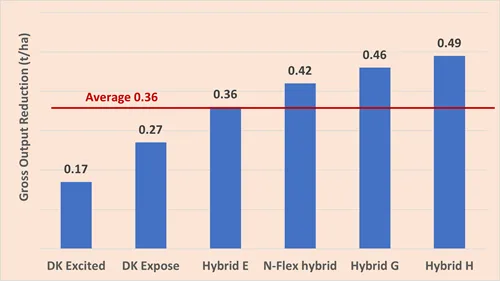
The superior nitrogen stress tolerance of two current Dekalb TuYV-resistant hybrids has stood out in restricted spring fertilisation trials for the second year in a row, both showing valuable improvements on a leading N-Flex hybrid control as well as the trial average.
Author
| 1st November 2022DEKALB Hybrids stand out against nitrogen stress tolerance
The superior nitrogen stress tolerance of two current Dekalb TuYV-resistant hybrids has stood out in restricted spring fertilisation trials for the second year in a row, both showing valuable improvements on a leading N-Flex hybrid control as well as the trial average.
Published at this year’s CropTec, the results of the replicated, three-site 2021/22 studies conducted under farm regimes show the gross outputs of six top-performing EX and competitor hybrids averaging between 3.9t/ha and 4.1t/ha and falling by an almost identical 0.70t/ha (just under 20%) when total nitrogen rates were cut from 180kg/ha to 100kg/ha.
A more realistic 40kg/ha reduction to 140kg/ha led the average gross output reduction to almost halve to 0.36t/ha. There was much greater variation between the varieties here, though, with DK Excited and DK Exposé the only varieties to lose noticeably less output than the average at 0.17t/ha (4%) and 0.27t/ha (7%) respectively (Figure).
In contrast, the gross output of the least nitrogen stress tolerant variety in the trial was reduced by nearly 0.5t/ha (12%) and even the leading N-Flex hybrid lost 0.42t/ha (10%).
Figure: Average 2022 gross output reductions from cutting nitrogen applications to sixvarieties from 180kg/ha to 140 kg/ha

Source: Bayer Dekalb replicated three-site trials
“Reflecting a more challenging season at our three trial sites, gross outputs were down on our previous year’s nitrogen restriction work,” notes Bayer trials manager, Richard Williams. “At the same time, we recorded greater across-the-board performance reductions from cutting nitrogen rates.
“Interestingly, though, the same two varieties stood out for losing both less yield and less gross output than the rest for the second year running, underlining their superior ability to tolerate nitrogen stress.
“Interestingly too, the varieties have quite different spring growth habits. Both are vigorous in their establishment and not over-rapid in their development before winter, so suit a wide early August to early September drilling window. But our detailed variety characterisation shows that DK Exposé starts regrowing after winter and flowers noticeably later than DK Excited.
“This suggests their particular efficiency in dealing with spring nitrogen restrictions – whether deliberate or as a result of environmental conditions – is quite separate from the way they grow. It also provides growers with the opportunity to take advantage of this ability regardless of the growth habit that best suits their conditions.
“Rather than considering nitrogen stress tolerance a distinct trait in our portfolio, we see it as just part of the superior all-round environmental resilience we have long focused on building into our varieties,” Mr Williams insists.
“DK Excited and DK Exposé follow in the footsteps of a number of highly successful Dekalb introduced since the first variety to emerge from our restricted-nitrogen development programme in 2016 in offering the greatest possible reliability of performance as well as flexibility of management.”